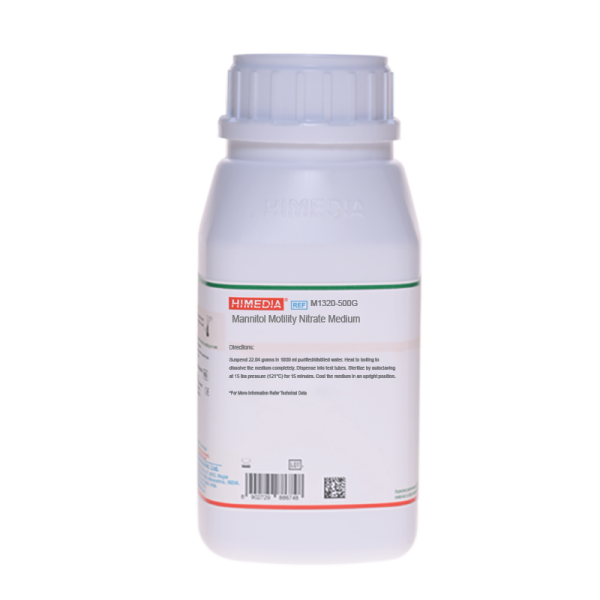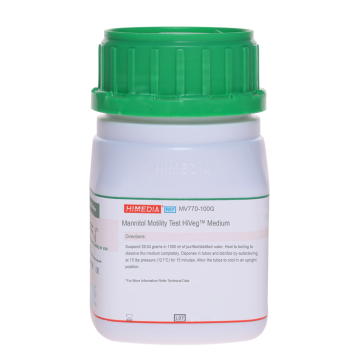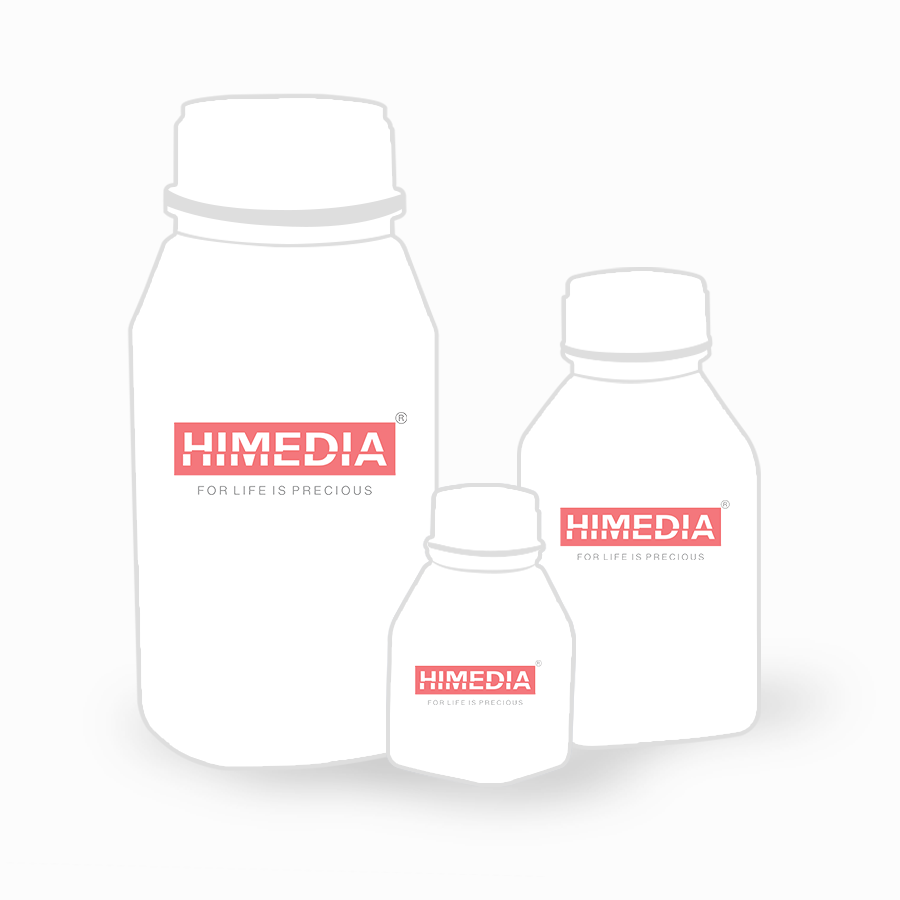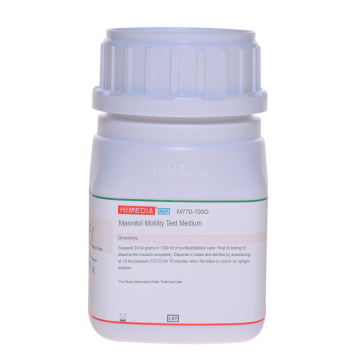 Your enquiry has been submitted
Your enquiry has been submitted
Mannitol Motility Nitrate Medium
Intended Use
Recommended for studying mannitol fermentation, nitrate reduction and motility of bacteria.
Composition**
| Ingredients | g/L |
|---|---|
| Tryptone | 10.000 |
| Potassium nitrate | 1.000 |
| Mannitol | 7.500 |
| Phenol red | 0.040 |
| Agar | 3.500 |
Final pH (at 25°C): 7.6±0.2
**Formula adjusted, standardized to suit performance parameters
Directions
Suspend 22.04 grams in 1000 ml purified/distilled water. Heat to boiling to dissolve the medium completely. Dispense into test tubes. Sterilize by autoclaving at 15 lbs pressure (121°C) for 15 minutes. Cool the medium in an upright position.
Principle And Interpretation
Mannitol Motility Nitrate Medium is designed to differentiate bacteria on the basis of their motility, ability to ferment mannitol and reduce nitrate (1). The highly nutritious tryptone supports luxuriant growth of bacteria. Semisolid nature of the medium due to 0.35% agar helps to detect motility. Motile bacteria produce diffused growth throughout the medium while non motile bacteria grow only along the line of inoculation. Combination of mannitol and phenol red helps differentiation of mannitol fermenting bacteria which turns the medium yellow.
Reduction of nitrate is generally an anaerobic respiration in which an organism derives its oxygen form nitrate. Members of Enterobacteriacae characteristically reduce nitrate to nitrite which reacts with sulfanilic acid and dimethyl-1-napthylamine to produce the red colour.
Type of specimen
Clinical samples; Water samples
Specimen Collection and Handling:
For clinical samples follow appropriate techniques for handling specimens as per established guidelines (2,3).
For water samples, follow appropriate techniques for sample collection, processing as per guidelines and local standards (4). After use, contaminated materials must be sterilized by autoclaving before discarding.
Warning and Precautions :
In Vitro diagnostic use. For professional use only. Read the label before opening the container. Wear protective gloves/ protective clothing/eye protection/ face protection. Follow good microbiological lab practices while handling specimens and culture. Standard precautions as per established guidelines should be followed while handling clinical specimens. Safety guidelines may be referred in individual safety data sheets.
Limitations :
- It is not a confirmatory test hence complete identification should include the morphology, gram reaction, biochemical and serological tests.
Performance and Evaluation
Performance of the medium is expected when used as per the direction on the label within the expiry period when stored at recommended temperature.
Quality Control
Appearance Light yellow to pink homogeneous free flowing powder
Gelling Semisolid, comparable with 0.35% Agar gel.
Colour and Clarity of prepared medium Red coloured clear to slightly opalescent semisolid gel forms in tubes
Reaction Reaction of 2.20% w/v aqueous solution at 25°C. pH: 7.6±0.2
pH 7.40-7.80
Cultural Response Cultural characteristics observed after an incubation at 35-37°C for 18-24 hours.
| Organism | Growth | Mannitol fermentation | Motility | Nitrate reduction |
|---|---|---|---|---|
| Escherichia coli ATCC 35218 | luxuriant | Positive reaction, yellow colour | Positive, growth away from stabline causing turbidity | Positive reaction red colour developed within 1-2 minutes |
| ## Proteus hauseri ATCC 13315 | luxuriant | Negative reaction, no colour change or red | Positive, growth away from stabline causing turbidity | Positive reaction red colour developed within 1-2 minutes |
| Salmonella Typhi ATCC 6539 | luxuriant | Positive reaction, yellow colour | Positive, growth away from stabline causing turbidity | Positive reaction red colour developed within 1-2 minutes |
| Shigella sonnei ATCC 25931 | luxuriant | Positive reaction, yellow colour | Negative, growth along the stabline, surrounding medium remains clear | Positive reaction red colour developed within 1-2 minutes |
| Staphylococcus aureus subsp. aureus ATCC 25923 (00034*) | luxuriant | Positive reaction, yellow colour | Negative, growth along the stabline, surrounding medium remains clear | Positive reaction red colour developed within 1-2 minutes |
| Staphylococcus epidermidis ATCC 12228 (00036*) | luxuriant | Negative reaction, no colour change or red | Negative, growth along the stabline, surrounding medium remains clear | Positive reaction red colour developed within 1-2 minutes |
Key: *Corresponding WDCM numbers. ## Formerly known as Proteus vulgaris
Storage and Shelf Life
Store between 10-30°C in a tightly closed container and the prepared medium at 15-30°C. Use before expiry date on the label. On opening, product should be properly stored dry, after tightly capping the bottle in order to prevent lump formation due to the hygroscopic nature of the product. Improper storage of the product may lead to lump formation. Store in dry ventilated area protected from extremes of temperature and sources of ignition. Seal the container tightly after use. Product performance is best if used within stated expiry period.
Disposal
User must ensure safe disposal by autoclaving and/or incineration of used or unusable preparations of this product. Follow established laboratory procedures in disposing of infectious materials and material that comes into contact with clinical sample must be decontaminated and disposed of in accordance with current laboratory techniques (2,3).
Reference
- MacFaddin, 1980, Biochemical Tests, for the Identification of Medical Bacteria, 2nd ed. Williams and Wilkins Baltimore.
- Isenberg, H.D. Clinical Microbiology Procedures Handbook 2nd Edition.
- Jorgensen, J.H., Pfaller, M.A., Carroll, K.C., Funke, G., Landry, M.L., Richter, S.S and Warnock., D.W. (2015) Manual of Clinical Microbiology, 11th Edition. Vol. 1.
- Lipps WC, Braun-Howland EB, Baxter TE, eds. Standard methods for the Examination of Water and Wastewater, 24th ed. Washington DC:APHA Press; 2023.
| Product Name | Mannitol Motility Nitrate Medium |
|---|---|
| SKU | M1320 |
| Product Type | Regular |
| Physical Form | Powder |
| Origin | Animal |
| Packaging type | HDPE |
| References | 1.MacFaddin, 1980, Biochemical Tests, for the Identification of Medical Bacteria, 2nd ed. Williams and Wilkins Baltimore. |






